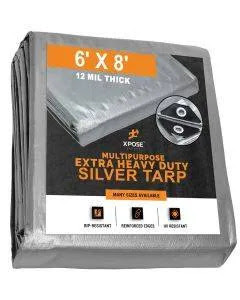The Essential Guide to Heavy Duty Industrial Tarps
When it comes to protecting valuable assets, ensuring safety, and maintaining cleanliness in industrial environments, heavy duty industrial tarps play an indispensable role. These tarps are designed to withstand the harshest conditions and provide reliable coverage and protection for a variety of applications. Whether you are in construction, agriculture, manufacturing, or logistics, understanding the benefits and uses of heavy duty tarps can significantly enhance operational efficiency.
Why Choose Heavy Duty Industrial Tarps?
Heavy duty industrial tarps are engineered for durability and resilience. Made from high-quality materials such as polyethylene, vinyl, or canvas, these tarps are built to last. They offer superior resistance to UV rays, water, mildew, and abrasions, making them ideal for both indoor and outdoor use. The robust construction ensures that they can handle heavy loads and rough handling without tearing or degrading.
One of the key advantages of heavy duty tarps is their versatility. They can be used to cover machinery, equipment, and raw materials, protecting them from the elements. In agriculture, they serve as effective covers for hay bales, crops, and livestock shelters. In the construction industry, heavy duty tarps are essential for covering building materials and scaffolding, preventing damage and ensuring safety on the job site. Additionally, they are commonly used for truck bed covers, providing secure and weatherproof transportation of goods.
Applications of Heavy Duty Tarps
Heavy duty tarps are incredibly versatile and can be used in a wide range of applications. In industrial settings, they are often employed as floor coverings to protect surfaces from spills, debris, and heavy machinery. These tarps are also used to create temporary walls or partitions in warehouses and factories, providing an easy and cost-effective way to section off areas or create clean workspaces.
In the agricultural sector, heavy duty tarps are indispensable for protecting crops and livestock from adverse weather conditions. They are used to cover silage pits, haystacks, and animal feed, preventing spoilage and contamination. Farmers also use these tarps to construct temporary shelters for livestock, providing protection from rain, wind, and sun.
In the midsection of industrial and agricultural uses, heavy duty tarps serve as reliable truck covers, ensuring safe and secure transportation of goods. They prevent moisture, dust, and debris from damaging the cargo, making them essential for logistics and transportation companies. Additionally, heavy duty tarps are used in landscaping projects to cover soil, mulch, and other materials, keeping them dry and ready for use.
Choosing the Right Heavy Duty Tarp
Selecting the appropriate heavy duty tarp for your needs involves considering several factors. The material is a critical aspect, as different materials offer varying levels of durability and resistance. For example, polyethylene tarps are lightweight, waterproof, and resistant to UV rays, making them suitable for most applications. Vinyl tarps, on the other hand, are heavier and more durable, providing excellent resistance to abrasions and chemicals.
The size and thickness of the tarp are also important considerations. Ensure that the tarp is large enough to cover the intended area or object, and choose a thickness that provides adequate protection. Thicker tarps are generally more durable and better suited for heavy-duty applications.
Another factor to consider is the presence of reinforced edges and grommets. These features enhance the tarp's strength and make it easier to secure in place. Grommets allow for easy attachment using ropes or bungee cords, ensuring that the tarp stays in position even in windy conditions.
Maintenance and Care of Heavy Duty Tarps
Proper maintenance and care can extend the lifespan of your heavy duty tarp. Regularly inspect the tarp for signs of wear and tear, and repair any damages promptly. Cleaning the tarp periodically helps prevent the buildup of dirt, mold, and mildew, which can degrade the material over time. When not in use, store the tarp in a dry, cool place to prevent damage from prolonged exposure to sunlight and moisture.
In conclusion, heavy duty industrial tarps are a valuable asset in various industries, offering reliable protection and versatility. By understanding their benefits, applications, and maintenance, you can ensure that your heavy duty tarps provide long-lasting performance and safeguard your investments.

Comments
Post a Comment